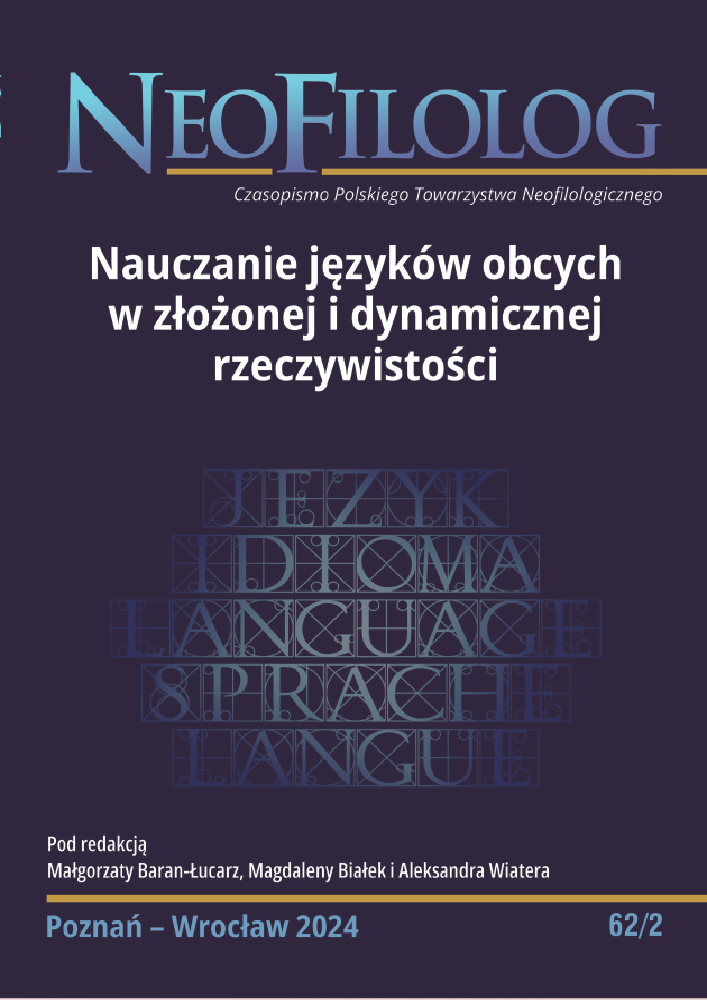Abstract
In February 2022, the invasion of Ukrainian territories by Russian forces took place, leading to a mass exodus of the Ukrainian population from the war-affected areas. Many individuals who left Ukraine due to the war sought refuge in Poland, and their children began attending Polish schools. Some of these children appeared in Polish classes only temporarily, but as reported by the Ministry of Education and Science in September 2023, 180,000 students from Ukraine began their education in Polish schools. The influx of Ukrainian children into Polish schools posed various challenges, especially for foreign language teachers, as their classes became linguistically and culturally heterogeneous. The aim of the conducted study was to answer the following questions: (1) What kind of challenges do German language teachers face in classes where students from Ukraine are learning? (2) Which teaching techniques do German language teachers consider most effective in linguistically and culturally heterogeneous classes? The article presents the results of the study conducted through interviews using an unstructured dialogical method with four German language teachers teaching elementary school students with migration experience. The research framework was based on the concept of Universal Design for Learning, taking into account the principles of inclusive teaching.
Literaturhinweise
Brophy J. (2007), Motywowanie uczniów do nauki. Warszawa: Wydawnictwo Naukowe PWN.
Deci E., Ryan, R. (1985), Intrinsic motivation and self-determination in human behavior. New York: Plenum. DOI: https://doi.org/10.1007/978-1-4899-2271-7
Gass S. (2003), Input and interaction, (w): Doughty, C. J., Long, M. H. (red.) The Handbook of Second Language Acquisition. Oxford: Blackwell, s. 225–255. DOI: https://doi.org/10.1002/9780470756492.ch9
Gulińska A. (2021), Wsparcie ucznia z doświadczeniem migracyjnym w polskiej szkole. Rozprawy Społeczne/ Social Dissertations 2021;15(2):40–54. Online: https://rozprawyspoleczne.edu.pl/Autor-Aleksandra-Guli%C5%84ska/176480 [DW 21.11.2023]. DOI: https://doi.org/10.29316/rs/136360
Hattie J. (2015), Widoczne uczenie się dla nauczycieli. Jak maksymalizować siłę oddziaływania na uczenie się. Warszawa: Centrum Edukacji Obywatelskiej.
Krause K., Kuhl. J. (2018), Was ist guter inklusiver Fachunterricht? Qualitätsverständnis, Prinzipien und Rahmenkonzeption, (w): Roters B., Gerlach D, Eßer S. (red.) Inklusiver Englischunterricht. Impulse zur Unterrichtsentwicklung aus fachdidaktischer und sonderpädagogischer Perspektive. Münster, New York: Waxmann, s. 175–195.
Łobocki M. (2006), Metody i techniki badań pedagogicznych. Kraków: Impuls.
Pamuła-Behrens M., Szymańska M. (2018), Metoda JES-PL. Nauczanie języka edukacji szkolnej uczniów z doświadczeniem migracji. „Języki Obce w Szkole”, nr 2, s. 5–10. DOI: https://doi.org/10.31261/PS_P.2018.22.11
Pertek A., Scheler S. (2016), Inklusions-Material. Deutsch Klasse 5–10. Berlin: Cornelsen.
Reich K. (2014), Inklusive Didaktik. Bausteine für eine inklusive Schule. Weinheim und Basel: Beltz Verlag.
Rokita-Jaśkow J. (2022), Uczeń z doświadczeniem migracji na lekcji języka angielskiego: wyzwania i rozwiązania. „Neofilolog”, nr 58/2, s. 193–208. DOI: https://doi.org/10.14746/n.2022.58.2.4
Rokita-Jaśkow J. i in. (2022), Bridging the ‘dual lives’: school socialization of young bi/multilinguals in the eyes of EFL teachers. „International Journal of Bilingual Education and Bilingualism”, s. 1–16. DOI: https://doi.org/10.1080/13670050.2022.2114788
Riemer C. (2016), Befragung, (w:) Caspari D., Klippel F., Legutke M.K., Schramm K. (red.) Forschungsmethoden in der Fremdsprachendidaktik. Tübingen: Narr Francke Attempto, s. 155–173.
Ryan R. M., Deci E. L. (2000), Self-Determination Theory and the Facilitation of Intrinsic Motivation, Social Development, and Well-Being. „American Psychologist”, Vol. 55, No. 1, s. 68–78. DOI: https://doi.org/10.1037//0003-066X.55.1.68
Szumski G. (2011), Teoretyczne implikacje koncepcji edukacji włączającej, (w:) Z. Gajdzica (red.), Uczeń z niepełnosprawnością w szkole ogólnodostępnej. Sosnowiec: Oficyna Wydawnicza „Humanitas”, s. 13–23.
https://www.gov.pl/web/udsc/obywatele-ukrainy-w-polsce--aktualne-dane-migracyjne2 [DW 21.11.2023]
Nowelizacja rozporządzenia w sprawie organizacji kształcenia, wychowania i opieki dzieci i młodzieży z Ukrainy. Online: https://www.gov.pl/web/edukacja-i-nauka/nowelizacja-rozporzadzenia-w-sprawie-organizacji-ksztalcenia-wychowania-i-opieki-dzieci-i-mlodziezy-z-ukrainy [DW 21.11.2023]
https://www.prawo.pl/oswiata/ukrainskie-dzieci-w-polskich-szkolach,520015.html [DW 21.11.2023]
Razem w klasie. Dzieci z Ukrainy w polskich szkołach. Raport z badania. Online: https://www.szkolazklasa.org.pl/materialy/razem-w-klasie-dzieci-z-ukrainy-w-polskich-szkolach/ [DW 23.11.2023]
Rozporządzenie Ministra Edukacji i Nauki z dnia 11 sierpnia 2022 r. zmieniające rozporządzenie w sprawie organizacji kształcenia, wychowania i opieki dzieci i młodzieży będących obywatelami Ukrainy https://www.dziennikustaw.gov.pl/DU/rok/2022/pozycja/1711 [DW 21.11.2023]
Rozporządzenie Ministra Edukacji i Nauki z dnia 13 lipca 2023 r. zmieniające rozporządzenie w sprawie organizacji kształcenia, wychowania i opieki dzieci i młodzieży będących obywatelami Ukrainy https://isap.sejm.gov.pl/isap.nsf/DocDetails.xsp?id=WDU20230001367 [DW 23.11.2023].
Lizenz
Copyright (c) 2024 Monika Janicka

Dieses Werk steht unter der Lizenz Creative Commons Namensnennung - Keine Bearbeitungen 4.0 International.
Autoren:
Die Autoren der zur Veröffentlichung in der Zeitschrift Neofilolog angenommenen Texte sind verpflichtet, den Vertrag über die Erteilung einer kostenlosen Lizenz für die Werke mit der Verpflichtung zur Erteilung einer Sublizenz CC auszufüllen, zu unterzeichnen und an die Adresse der Redaktion zurückzusenden.
Gemäß Vertrag erteilen die Autoren auf die in der Zeitschrift Neofilolog veröffentlichten Texte der Adam-Mickiewicz-Universität in Poznań eine nicht exklusive und kostenlose Lizenz und erlauben die Verwendung der Sublizenz Creative Commons Attribution-NoDerivatives 4.0 International (CC BY-ND 4.0).
Die Autoren behalten das Recht zur weiteren freien Verfügung über das Werk.
Benutzer:
Interessierte Onlinebenutzer dürfen die seit 2017 veröffentlichten Werke unter folgenden Bedingungen nutzen:
- Anerkennung der Urheberschaft - die Verpflichtung, zusammen mit dem verbreiteten Werk Informationen über die Urheberschaft, den Titel, die Quelle (Links zum Originalwerk, DOI) und die Lizenz selbst bereitzustellen;
- ohne Schaffung abgeleiteter Werke - das Werk muss in seiner ursprünglichen Form erhalten bleiben, ohne Zustimmung des Autors dürfen keine Studien, beispielsweise Übersetzungen, verbreitet werden.
Die Urheberrechte aller veröffentlichen Texte sind vorbehalten.
Sonstige:
Die Adam-Mickiewicz-Universität in Poznań behält das Recht auf die Zeitschrift als Gesamtheit (Layout, Grafik, Titel, Umschlagsprojekt, Logo usw.).

